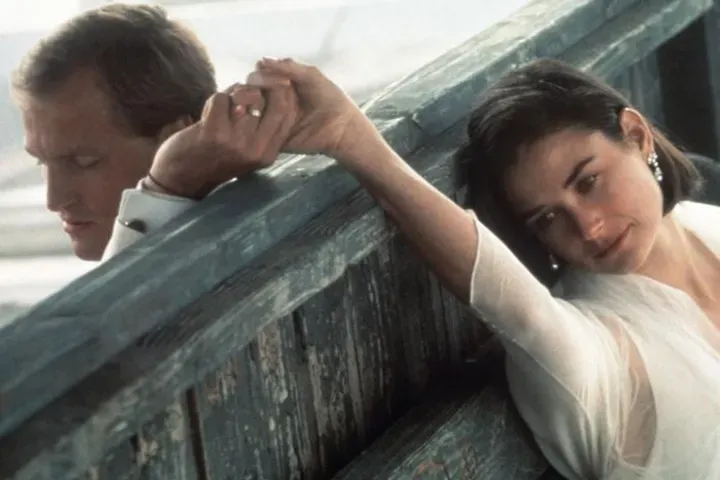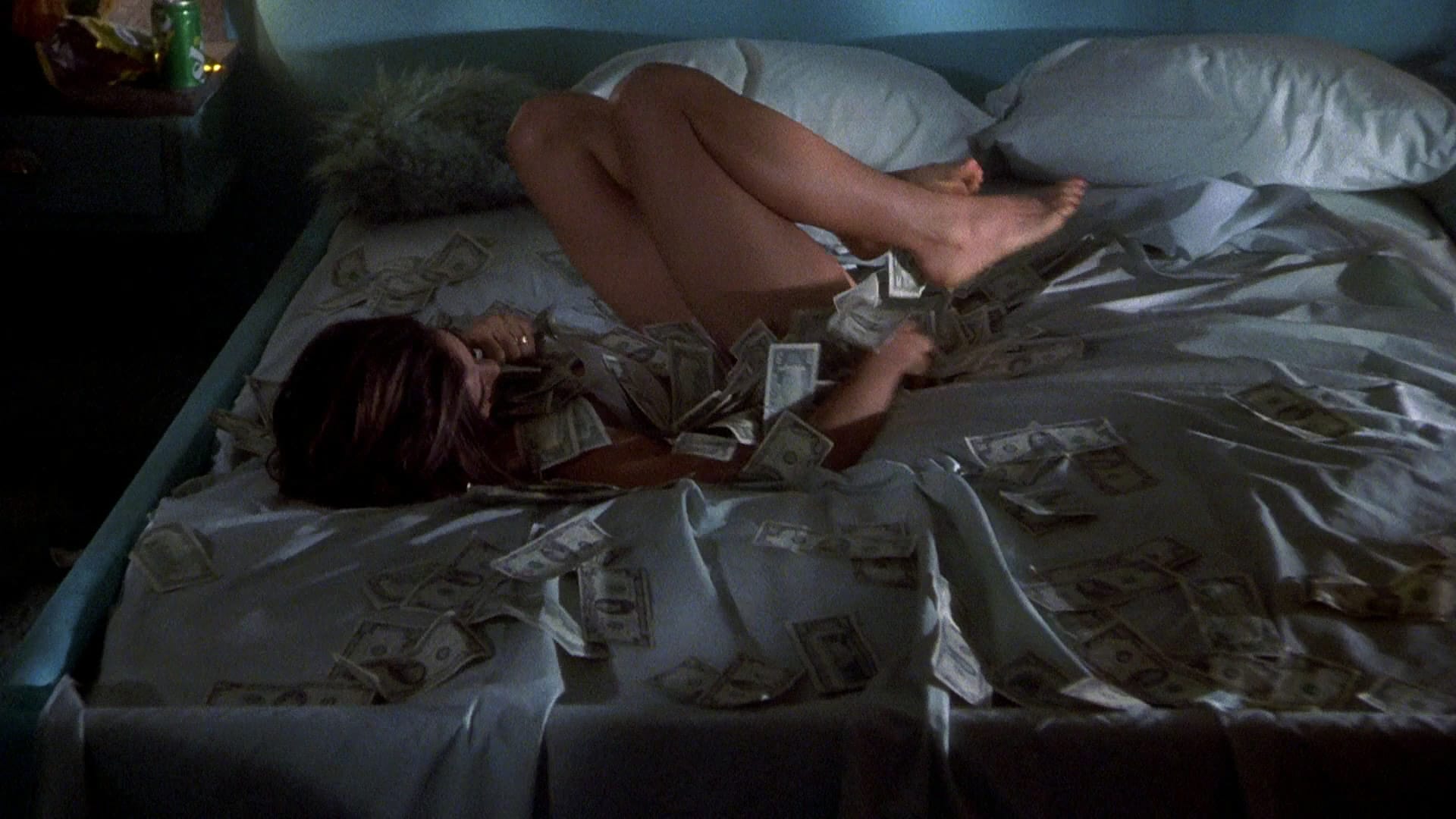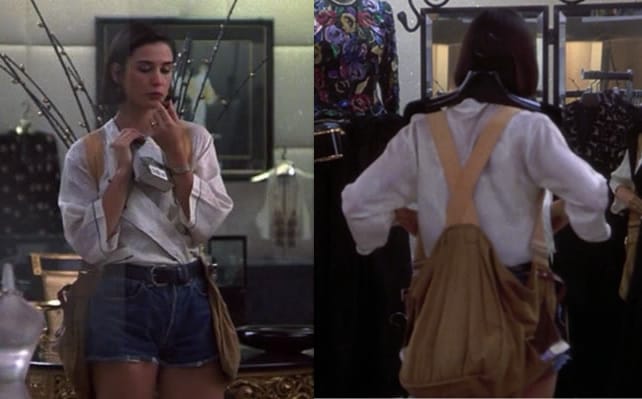The Tragedy of Heterosexuality: Indecent Proposal (Adrian Lyne, 1993)
Thrills! Of an erotic nature!

I no longer understand straight people. I’m not trying to be cute here: I used to get it. I used to be it, albeit awkwardly. Just a few years ago, I more or less knew the rules and aesthetics that governed heterosexual couples, and how to behave when you were trying to be in one. Now, when I watch movies about heterosexual marriage, I am flabbergasted. None of the norms or values translate. I feel like Florence Pugh in Midsommar, being inducted into these people’s flowery, sunlit, yet strangely violent lifestyle.
This has been a newsletter about horror movies for six years now. I have admittedly stretched the definition of “horror.” I’ve thrown in a lot of essays about something else. But I’ve stayed committed to this one genre for a very long time, and now, my eye has started to wander. To keep my relationship with horror spicy, I’ve decided to bring in a third. A new genre, one that I can’t see myself committing to long-term, but which is nonetheless exciting.
From now until the end of June, possibly the end of summer, this will be a newsletter for EROTIC THRILLERS. Giallo di sessualità. Les thrillers erotiques. We will be starting with one of the most ubiquitous erotic thrillers of all time, a movie whose plot managed to worm its way into my brain in 1993, despite the fact that I was eleven years old and completely forbidden to watch it: Indecent Proposal.

As you can see from the spreadsheet, the erotic thriller is a tight, contained, formally rigorous genre. There are a few regular actors and a few regular directors; there are a few standard plots; the second-tier movies in this genre tend to just be unofficial remakes of the A-list ones. An erotic thriller hits a few expected beats, in order, every time, and you hope it hits them well enough to satisfy you. It’s a lot like marriage that way.
Erotic thrillers are obsessed with marriage. Specifically, the straight kind (which, in the 1990s, was all there was). No genre has ever been more open about the fact that heterosexuality is a social construct, or that patriarchy contains the seeds of its own destruction. At the center of almost every erotic thriller is a heterosexual man, aiming to preserve dominance within his heterosexual couple, and then the whole terrifying world of non-normative sexuality — gay people, swingers, kink, women who like orgasms — comes in and brings his world crashing down.
The doomed heterosexual man of Indecent Proposal is Woody Harrelson, and odds are, you know what happens to him, so I’ll try to keep this brief. Woody Harrelson is an architect (one of those artistic-but-lucrative professions every upwardly mobile protagonist had in the 1990s) who is married to high school sweetheart Demi Moore and working to build his dream house. Unfortunately, when he is laid off due to The Recession (‘90s!) he can no longer pay his loans. Woody Harrelson decides to go to Vegas with Demi Moore and gamble until he wins exactly fifty thousand dollars. This plan does not work out. Or maybe it works out very well, because in Vegas, Demi Moore runs into a billionaire, played by Robert Redford, and he offers to pay Woody Harrelson a million dollars for one night of sex. The sex is with Demi Moore, not Woody Harrelson. It’s admittedly hard to tell, because the female character at the center of all this is treated like a prize milking cow throughout.
In between all of these plot points, Woody Harrelson and Demi Moore get Erotic, by which I mean that adult contemporary starts playing on the soundtrack, they whip off their shirts, and they start grinding and rubbing their mouths on each other until the camera cuts to a new scene right as the Hammond organ solo kicks in. It’s never clear to me why they’re doing this, as in, what makes these moments of their relationship more Erotic than any other. At one point, Demi Moore chases Woody Harrelson with a knife because he never does his own laundry, punches him square in the head, and then they fuck because, I guess, she was “kidding?” These movies do not take a charitable view of feminism, is (I suppose) my point.

The Eroticism is certainly executed with workmanlike vigor. At one point, you can clearly see Woody Harrelson’s erection through his underpants. It’s not the focus of the shot, and it’s over quick, but when it’s over, you will forevermore be someone who has seen Woody Harrelson’s dick in action. It is at this juncture that I will quote from Demi Moore’s 2019 memoir, describing what it was like to shoot these scenes. What you cannot hear (because of all the adult contemporary on the soundtrack) is that director Adrian Lyne was standing a few feet away, screaming at her: “Lyne would cry things like 'Fucking raunchy!' and 'Oh god, got a boner on that!' Here was this guy getting all sweaty and worked up, yelling about boners."
I hear a lot about how there’s not enough sex in movies these days, and how the Gen Z puriteens have ruined everything. While I can agree in theory, I genuinely think many of these people are forgetting what sex scenes used to look like: Two randomly selected white people rolling around on each other to Kenny Loggins, while some poor actress fends off both the inadvertent boner of her co-star and the ardently desired, loudly proclaimed boner of her boss behind the camera.
Alas, this is the heterosexual paradise that Robert Redford has arrived to disrupt. The proposal part of Indecent Proposal was what everyone talked about at the time. It became popular for adults to ask each other whether they would “do it.” I’m not sure what the “it” is here — swinging? Sex work? Driving a man to extremes of carnal desire wearing an oversize button-up and jorts, which Demi Moore also does in this movie? — but I can assure you that either swinging or sex work would be a hell of a lot more dignified than what these straights whip up.

Demi Moore agrees to the proposal, and Woody Harrelson agrees right along with her, until five seconds after he realizes he’s left his wife in a hotel room with Robert Redford, at which point he freaks out and does the Will Ferrell “glass case of emotions” bit with (a) an elevator, (b) a hotel room door, (c) multiple doors and walls of multiple other buildings, throughout the movie. He goes from mild-mannered architect to a one-man wall-punching machine in fifteen minutes, and, having reached that second gear, he does not slow down for the rest of the movie.
Oddly enough, both he and his wife will end this night screaming for D.
Meanwhile, Demi Moore is caught between two worlds: Her broke-ass husband who never stops screaming, and Robert Redford. (The movie really tries its best to make this seem like a difficult choice.) Robert Redford, despite having retained Demi Moore for what is quite clearly sex work, insists that whatever goes on between them is not sex work. He never pays for sex — he says, having just paid her one million dollars — but he wanted to prove to Demi Moore that she “could be bought,” because she said she couldn’t be, and he wanted to degrade her and show her how easily she would betray her own most deeply held values because… he’s in love with her???? I guess????? And wants to build a healthy, committed relationship with her from this point forward???
This movie goes all-in on this twist. The whole second act is Robert Redford being romantic and sincere about this woman he met while performing a sexual Stanford prison experiment on her. It doesn’t make a ton of sense, but misogyny is a powerful force, and throughout history, men have been trained to believe they can hate women and love them at the same time. Also, the movie had about an hour of screen time to fill between the indecent proposal part and the ending.
For a hot second, it really seems like Demi Moore is going to get away with everything — she’ll get the money, the newly nice Robert Redford, the ability to ignore Woody Harrelson while he slowly punches his way through every wall in the greater Los Angeles area to express his suffering — but, alas, the erotic thriller threatens the heteropatriarchal couple only to reaffirm its dominance, and so Woody Harrelson must reclaim his property (again: a real live human woman with, like, thoughts and feelings) once again.
Got it? Good. Let's process.
Here is what baffles me about Indecent Proposal, or maybe about heterosexuality: Deep down, I think the filmmakers understand that every sexual relationship in the movie is a monetary exchange. In the scenes where Moore is married to Harrelson, she seemingly doesn’t work outside the home; it’s only when they break up that she gets a job. Which is not to say that she’s ever unemployed. Woody Harrelson pays Demi Moore to have sex with him and tend to his emotional and domestic needs — that’s why he never picks up his socks; it is, literally, her job — and she “loves” him, exclusively, for as long as the work pays.
What Robert Redford is doing — offering money for sex and companionship — is the same thing Woody Harrelson is doing. Working for him pays better. That’s the only difference. Both of them want the same thing, the full girlfriend experience, but Redford is slightly more direct in terms of negotiating.

I’m not demeaning Demi Moore’s choices. I’m saying she would be making some version of this choice, no matter who she was with, because this is how it works: Men marginalize women, in order to keep them economically dependent, so that those women will be reliant on either sex work or heterosexual marriage to pay the bills. It’s the plot of Indecent Proposal, it’s the plot of Beauty and the Beast and Cinderella and Snow White, it’s the plot of every single Jane Austen novel, and those Jane Austen novels are really good: “Love,” as a mutual and voluntary meeting of souls, untainted by economic coercion or power dynamics, cannot exist within a patriarchal arrangement. Women cannot marry for love, because they are marrying their financial future. Men might believe they feel love, but you can’t really love somebody you own.
I don’t think I’m extrapolating or spitballing here. It’s the intended message of the movie, so obvious that it’s in the title: Proposal. It’s what you do when you ask someone to marry you, and it’s also what you do when you pay someone a million dollars to sleep with you, because those are two versions of the same thing.
Indecent Proposal stares the equivalence in the face. Then it backs down. It concludes that money doesn’t matter, that Woody Harrelson might be just as good as Robert Redford (better, even!) and that there’s some sort of immortal predestined soul bond that can withstand being let down and yelled at and called names and traded like a cow for some magic beans, and that this soul feeling is what Demi Moore feels for Woody Harrelson, because if it isn’t… what? If it isn’t, heterosexual marriage isn’t sacred. It isn’t inherently more moral than being queer or being single or being a swinger who pays women to fuck you on your boat. Marriage doesn’t mean happily ever after. It doesn’t mean you’ve finally met your soulmate. It means that two people have made a rational and calculated decision to share their future expenses, and that, if the math stops working, the marriage might stop working too.
That’s scary, and not all the soft-focus Kenny Loggins sex jams in the world can make it less so. The erotic thriller (particularly this erotic thriller) has to invest in the heterosexual couple as something special, supernatural, destined, because if it didn’t, the story as told would be calling for its destruction. No-one would actually want to live like this if it weren’t the only option, and the thing is: It isn’t. We’ve just decided not to know that. Indecent Proposal comes right up to that acknowledgment. Then it walks away, toward the sadness of its happy ending.
That’s enough analysis! Now, it’s time to see how this movie adds up on the extremely sensual Spreadsheet of Sin.

Demi Moore: Obviously.
Terrifying Female Sexuality: Demi Moore’s, mostly.
Boobs: Demi Moore’s, mostly.
Gay People: Demi Moore, probably. I’m spiritually including Woody Harrelson’s bicurious lawyer, the screenwriter couple pitching a Star is Born reboot featuring Diana Ross and Billy Ray Cyrus, and Diana’s mean boss at the real estate agency, because I have that same shirt.
Boats: Robert Redford seduces Demi Moore on one.
Dong: Two — Woody Harrelson’s, and the never-seen but all-powerful dong of director Adrian Lyne. HE GOT A BONER ON THAT ONE, DEMI!!! KEEP GOING!!!!
Indecent Proposal is streaming on Paramount Plus. At my other job: It's been ten years since the Trans Tipping Point of 2014. I asked nine trans people who've been around longer than I have about what's actually changed for trans people.
It's Pride, which means you not only get especially erotique content for the month, you get a 25% discount on your subscription for the first 12 months.
Every subscription you buy keeps a transgender dubiously employed and prevents me from falling into a life of commercial boat sex with Robert Redford, so sign up now.